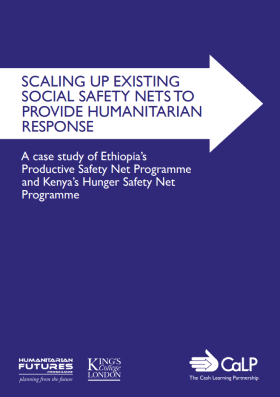Scaling Up Existing Social Safety Nets to Provide Humanitarian Response: A case study of Ethiopia’s Productive Safety Net Programme and Kenya’s Hunger Safety Net Programme
A case study of Ethiopia’s Productive Safety Net Programme and Kenya’s Hunger Safety Net Programme.
This thematic report has been undertaken as part of a 2013 research study entitled, Is Cash Transfer Programming ‘Fit for the Future’? The research was commissioned by the the CALP Network and undertaken by the Humanitarian Futures Programme (HFP), King’s College London. The overall project intends to understand how changes in the broader global and humanitarian landscape may evolve in the future (up to 2025), and how these changes might shape cash transfer programming (CTP). The analysis examines these issues in the context of ongoing global dialogue on the future of humanitarianism, including the post-2015 Millennium Development Goals processes, the deliberations for the next iteration of the Hyogo Framework for Action, and the World Humanitarian Summit 2016.
It is hoped that the products from this project will be widely disseminated, and their conclusions and recommendations debated at all levels within the sector. This process should result in a set of priorities that can serve as the basis for a forward-looking action agenda. Ideally, this agenda should be conceived by the full network of actors identified in this analysis who have an interest and role in the evolution of CTP. This thematic report has been developed as a stand-alone document, and is just one of the products developed under this project. The project’s other outputs can be found in an Annex Package, and a Final Report pulls all the research together. An Executive Summary of the Final Report is also available.
This research was commissioned by the CALP Network, with the generous support of the European Commission’s Humanitarian Aid department (ECHO) and the UK Department for International Development (DFID).



